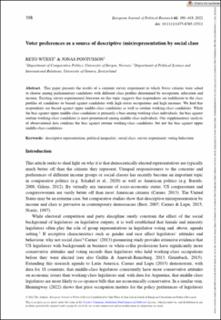Voter preferences as a source of descriptive (mis)representation by social class
Journal article, Peer reviewed
Published version

Åpne
Permanent lenke
https://hdl.handle.net/11250/3055062Utgivelsesdato
2022Metadata
Vis full innførselSamlinger
Originalversjon
European Journal of Political Research. 2022, 61 (2), 398-419. 10.1111/1475-6765.12511Sammendrag
This paper presents the results of a conjoint survey experiment in which Swiss citizens were asked to choose among parliamentary candidates with different class profiles determined by occupation, education and income. Existing survey-experimental literature on this topic suggests that respondents are indifferent to the class profiles of candidates or biased against candidates with high-status occupations and high incomes. We find that respondents are biased against upper middle-class candidates as well as routine working-class candidates. While the bias against upper middle-class candidates is primarily a bias among working-class individuals, the bias against routine working-class candidates is most pronounced among middle-class individuals. Our supplementary analysis of observational data confirms the bias against routine working-class candidates, but not the bias against upper middle-class candidates.
